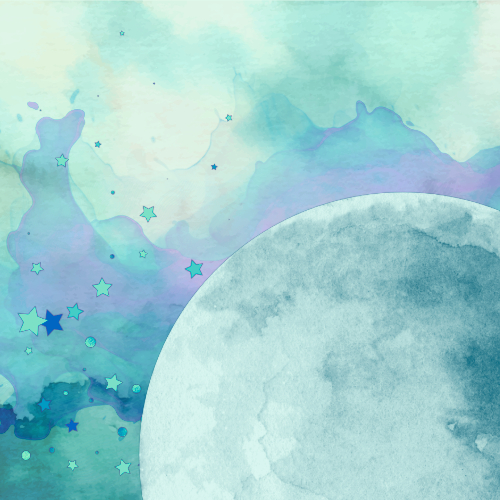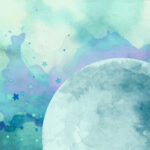What Moon Wouldn't Give
Flash Fiction
by Dawn Tasaka Steffler
Halley’s Comet passes, and Earth feels sick to her iron core because Theia is barreling straight for her. When Theia was further away, Earth had hoped for a side-swipe where they’d ricochet off each other. But now there is no doubt this will be head-on. And Theia is a big girl; she’s no asteroid. As the distance between them shrinks, Earth closes her eyes and braces for impact while Theia uselessly puts her arms out in front of her as if that would stop anything.
Moon doesn’t remember any of this; she wasn’t born yet. Whenever Moon is feeling sorry for herself — because her orbit is crippled and she can’t rotate on her axis — Earth tells her the story of her miraculous birth. Theia didn’t survive impact, but pieces of her and Earth had blasted into space and eventually accreted into Moon, and Theia’s iron heart is resting down in Earth’s molten core. After each telling, Earth sings You Are My Sunshine to try and cheer Moon up, their hands clasped together, fingers intertwined, spinning each other around in the dark, light.
*
Halley’s Comet passes, and Earth is preoccupied with the scaly, pokey, crawly life forms that appeared out of nowhere. They glide on her air currents, lurk in her amniotic waters, and roam her humid, green jungles. Earth can’t stop complaining about their small-minded savagery: they hunt then eat each other, they are endlessly mating, popping out wave after wave of eggshell offspring.
But to Moon, it feels like Earth is showing off. What Moon wouldn’t give to have life forms instead of barren, dusty silence. She can’t even look away from Earth’s annoying blue-green perfection because her pale, pancake face is fixed in place. So, she turns inward, imagining her tragic, other-mother Theia: icy traveler from the outer solar system, bearer of water. Moon thinks Theia was probably stunningly beautiful. Even more beautiful, perhaps, than Earth.
*
Halley’s Comet passes, and tiny, white objects blast up from Earth’s surface. One day, an object starts inching its way toward Moon, which astonishes her! Cross-eyed, she watches the boxy object land on her. Then even tinier life forms emerge from within. Moon is overcome with joy! At last! My own life forms! But they don’t stay long, just some hopping around before shooting off again, leaving behind their object’s legs and a stiff, little rectangle on a stick. Curious, Earth asks Moon what she thought of the visit, and Moon remembers how their feathery lightness felt on her surface. “They kind of tickled,” Moon says, beaming.
Meanwhile, Moon sees the effects Earth’s life forms are having on her: flotillas of plastic garbage eddying in her oceans, a bald spot in her ozone layer, and Moon swears that Earth used to have more green on her than she does now. Still, Moon is impatient with Earth’s complaints. Each time Earth says, “I swear these things are trying to kill me,” Moon wants to scream. Until one day, she blurts out, “If you’re so miserable, maybe you should’ve been the one who died!” And for a hundred years, Earth goes silent.
*
Halley’s Comet passes, and Earth is feverish and dozing, her blue-green turned brown-grey. Floating above Earth is a layer of debris from all the objects her life forms ever shot out into space, smooth, round things and prickly black things that smashed into themselves a million times over until they were reduced to an exosphere of sharp-edged, glinting fragments. Only a handful of those objects ever visited Moon again; most whizzed off into the blackness of space. But Moon doesn’t care. She has no interest in life forms anymore. She sees what they’ve done to Earth.
Moon often finds herself going back to one of their last conversations. She was worried Earth was angry with her, and to Moon’s enormous relief, Earth had shot back, “Of course not! Why in the world would you think that?” “Because my tides melted all your ice, bleached your reefs, boiled your beautiful whales—” And Earth shushed her, “They did this to me, not you. And they’re still doing it.” Which is when Earth erupted into another one of her coughing fits, and it took everything Moon had to not avert her eyes. Then, when Earth’s coughing fit was over, she squeezed Moon’s hands the tightest she ever had and wheezed, “I’m so afraid they’re never going to stop.”
*
Halley’s Comet passes, and Earth’s hands are slack. It’s only Moon holding on now, swinging Earth’s dead weight around in the light, dark. It’s been four and a half billion years, and she can’t let go. What if I change my mind?
Moon has been dreaming about Theia, careening through deep space like a spectacle. And she can’t help wondering about all those objects Earth’s life forms shot out into space. Where were they going? What were they seeking?
*
Halley’s Comet passes, and Moon lets go of Earth’s hands. One finger at a time until they’re connected only by a pinkie, and then not even pinkies. Slowly, Moon feels herself drifting off on an unfamiliar trajectory. She feels herself spinning for the first time, and it makes her nauseous, not just the physical sensation but because Earth gradually disappears from view and is replaced by the void of deep space. And just when Moon is drowning in her deepest panic — hyperventilating, arms flailing behind her, searching for Earth’s limp hands — the tiniest sliver of Earth reenters her field of vision, and Moon recomposes. Remembers. Readies herself. Over and over, this happens: Earth disappearing, reappearing, Earth growing smaller as Moon’s trajectory pulls her away. Until Moon has traveled far enough away that Sun’s light no longer touches her. Immersed in that utter blackness, Moon suddenly understands everything.

About the Author
Dawn Tasaka Steffler (she/her) is an Asian-American writer from Hawaii who lives in the San Francisco Bay Area. She was a Smokelong Quarterly Emerging Writer Fellow, winner of the Bath Flash Fiction Award, and was selected for both the 2024 Wigleaf Top 50 long list and 2025 Best Small Fictions. Her stories appear in Pithead Chapel, Fractured Lit, Moon City Review, The Forge and more. She is working on a novella-in-flash that explores the challenges and joys of parenting queer kids. Find her online at dawntasakasteffler.com and on BlueSky and Instagram.


